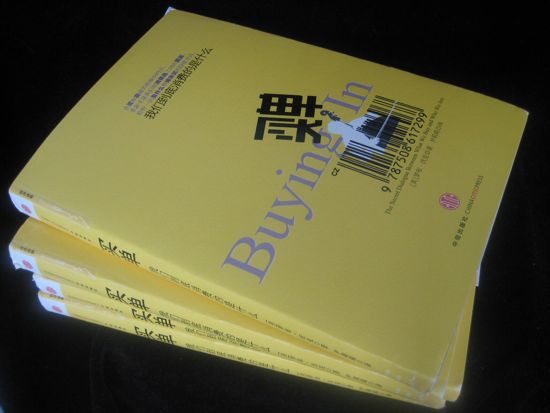
I got four copies of the “simplified Chinese” translation of Buying In today. Pretty cool, although I’m not sure what to do with four copies. Paging through, it was fun to look at the words and phrases (basically brand names and slang) that are I guess either untranslated or rendered in both languages for clarity.
Anyway it’s kind of a nice book, physically speaking.
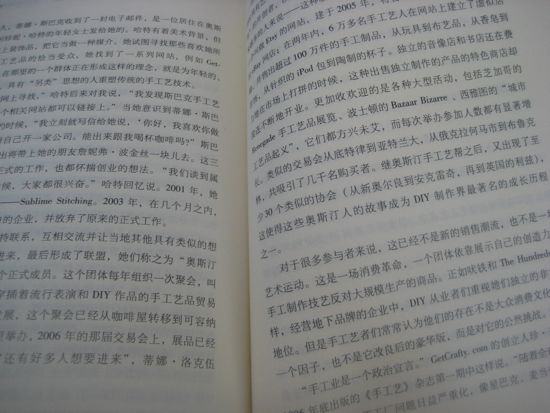
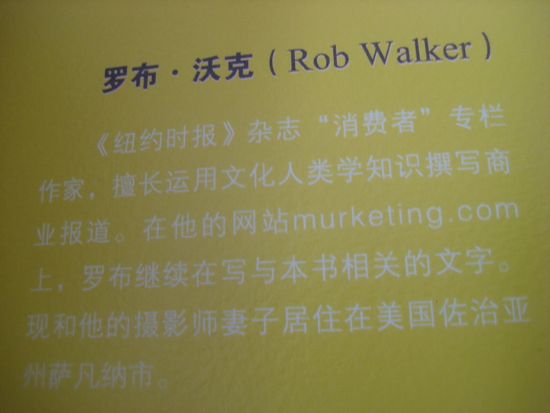
Disassembled household appliances photographed by Brittny Badger, via the invaluable Junk Culture.
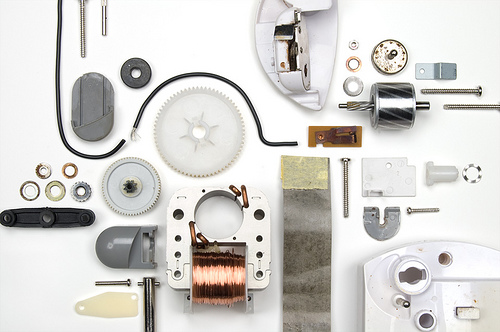
Can Opener; click for more.
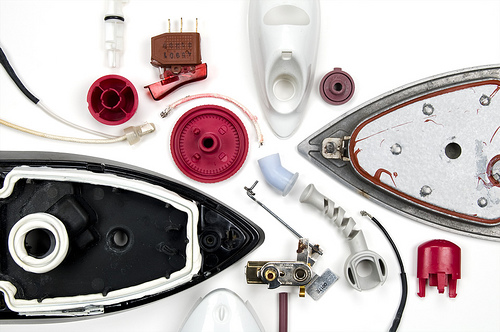
Iron; click for more.
See also Adam Voorhees’ “Exploded” images, noted early on in this series of posts.
Posted Under:
Artists by Rob Walker on April 21, 2010
Comments Off on Pictures of stuff, cont’d: Disassembled
PSFK points out these recent fake products evidently placed in retail locations by TrustoCorp. An example of shopdropping, a form of semiotic disobedience discussed earlier on this site here and here (and also here, when shopdropping was, oddly, picked up as an alleged “trend” by a murketer). Some of these are fun, and an interesting example of using imaginary brands in the real world.
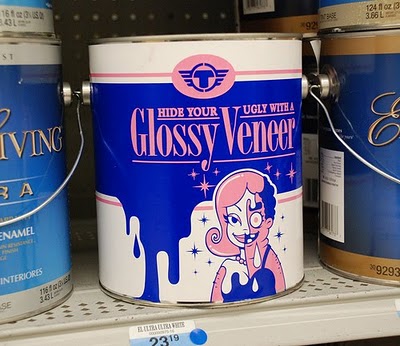
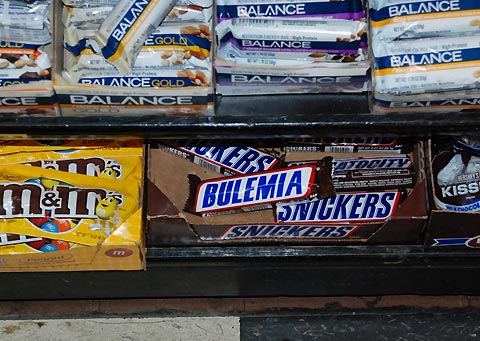
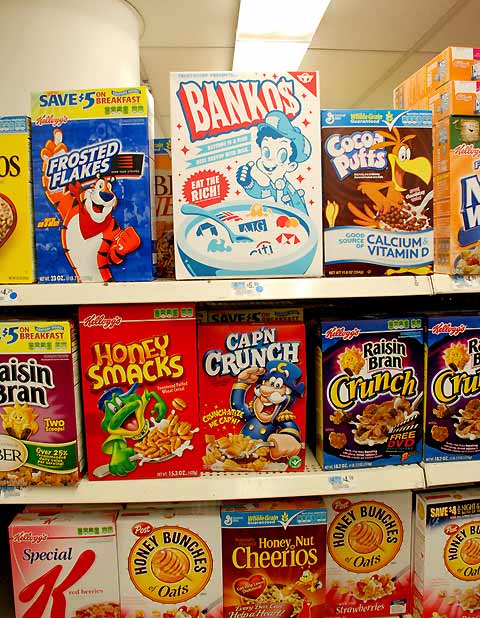
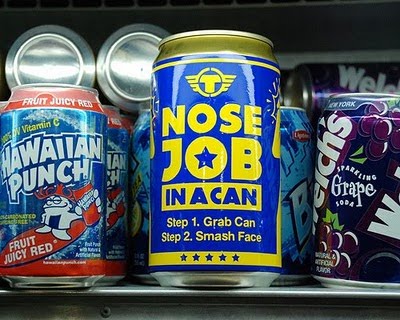
- Constriction to force ourselves to create: Jack White: “Only having red, white and black colors on any of the artwork or presentation of aesthetics of the band, guitar drums and vocals, storytelling melody and rhythm, revolving all these things around the number three, all these components force us to create.” Related post on rules, creativity, and book cover design, here.
- Monocle magazine funds foreign bureau on sales of tote bags: How did I miss this?
- What’s a YouTube phenomenon worth?: David after Dentist guy: “We’ve made in excess of $100,000. Significantly over that, you know, low six figures.”
- Luce and Time vs. Harold Ross and The New Yorker: Excellent piece by Jill Lepore, who is becoming one of my favorite writers.
- Web Coupons Tell Stores More Than You Realize: “While the coupons look standard, their bar codes can be loaded with a startling amount of data, including identification about the customer, Internet address, Facebook page information and even the search terms the customer used to find the coupon in the first place.”
- I Am Not An Artist: “An animated gif paranoia about nonstop design workers.” Pretty spectacular.
These links compiled via delicious, and repurposed here with plug-in Postalicious. Not enough stuff? Not the stuff you wanted? Try visiting unconsumption.tumblr.com, murketing.tumblr.com, and/or the Consumed Facebook page.
Marginal Revolution points to this:
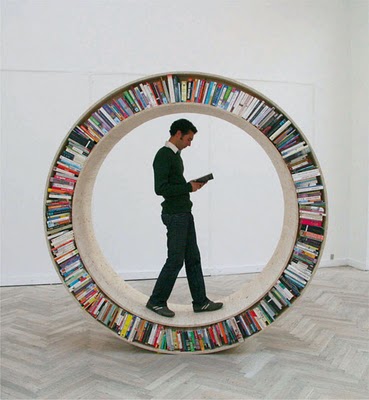
No attribution at present for artist/designer. Click pic for more.
That’s from a blog called Bioephemera, which asks its readers if anybody knows who made thing [UPDATE April 23,2010: Core77 mentions this object and its creator: David Garcia], and also points to this somewhat similar item:
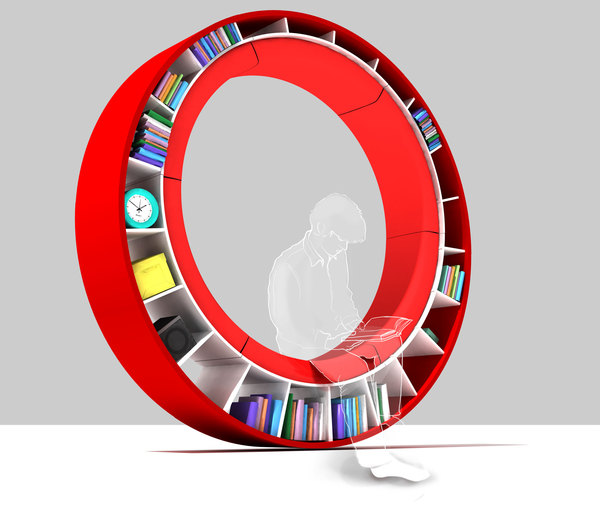
By Irina Zhdanova, click for detiails.
This post is part of a series.
Monocle has launched a “book collection,” with a reprint.
First in the series is a limited edition of Alain de Botton’s The Pleasures and Sorrows of Work. Originally published by Penguin, each book is printed on (retin-a) quality paper, bound in linen and signed by the author. They also contain an exclusive DVD interview.
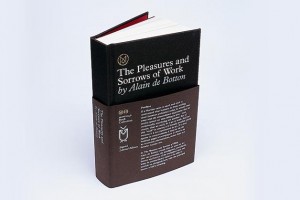
£60
I’m quite interested in the idea of a sort of fancy, limited version of a book that was actually published earlier by a mainstream house. What do you think of that concept?
It’s a little odd in that the conventional thought would be to do this concurrently (or to reprint a more obscure “forgotten,” older book), I think. But I think this timing, as a kind of almost-belated endorsement, is rather interesting.
That said, Caleb Crain absolutely kicked the shit out of this particular book in an NYT review last year. But I suppose that’s neither here http://pted.org/Propecia.php nor there.
Part of a series.
Via Harold Check. Part of a series.
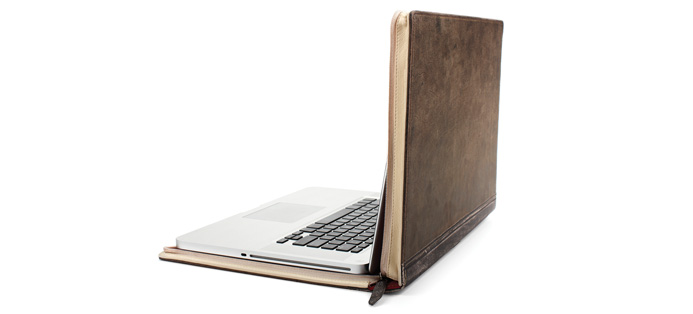
BookBook, click for more.
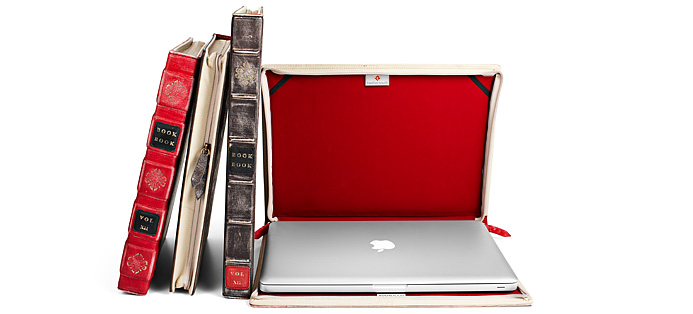
BookBook, Click for more.
Posted Under:
The Designed Life by Rob Walker on April 18, 2010
Comments Off on Books, the idea, cont’d: Laptop-disguising bookform
I’d been meaning to mention that Lisa Congdon’s Collection A Day blog, mentioned earlier here, is still awesome. The perfect excuse: the below, via Swiss Miss.
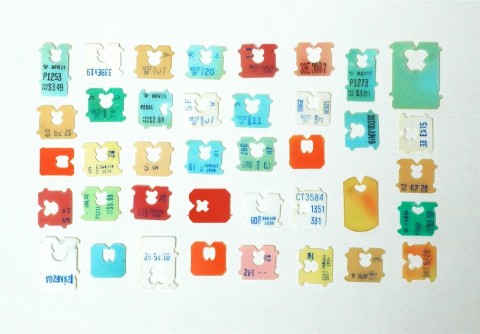
Day 107: Bread Bag Ties. Click for more.
This post is part of a series.
Posted Under:
Things/Thinking by Rob Walker on April 18, 2010
Comments Off on Pictures of Stuff, cont’d: Bread Bag Ties
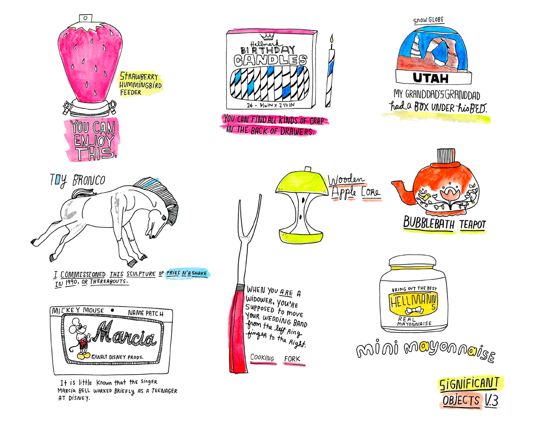
11×14; edition of 500: $50!
I teased this last week — and now it’s here! We’re really excited to announce the latest Significant Objects team-up, resulting in thoroughly affordable art, and another way to support v3 beneficiary Girls Write Now.
The prints you see on this page are available in limited editions from 20×200, Jen Bekman’s online project that sells a dazzling array of prints from an impressive roster of artists, all priced to meet a mission of making art available to all.
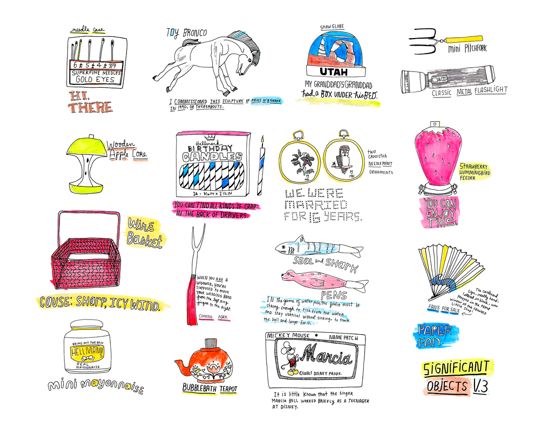
16×20; edition of 20: $200!
The artist is Kate Bingaman-Burt, whose delightful book Obsessive Consumption was just published, and whose combination of thoughtfulness about consumer behavior and mad drawing skills make her our perfect match.
All these prints are created using archival pigment inks on 100% cotton rag paper with a matte finish.
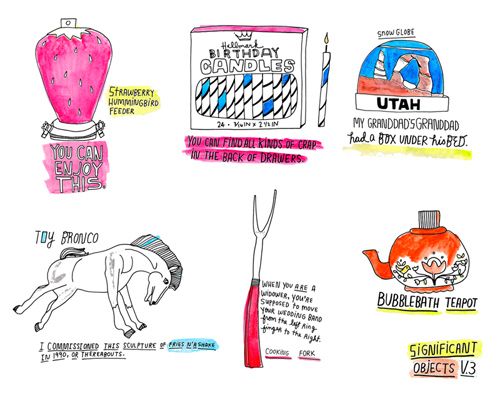
8×10; edition of 200: $20!
Proceeds from the sale of these prints will benefit Girls Write Now, contributing to Significant Object’s grand total donation.
Girls Write Now provides guidance, support, and opportunities for New York City’s underserved or at-risk high school girls, enabling them to develop their creative, independent voices, explore careers in professional writing, and learn how to make healthy choices in school, career and life.
Please continue…
Posted Under:
Artists,
Pleasing,
Things/Thinking by Rob Walker on April 17, 2010
Comments Off on Signficant Objects X Kate Bingaman-Burt X 20×200 — now available!
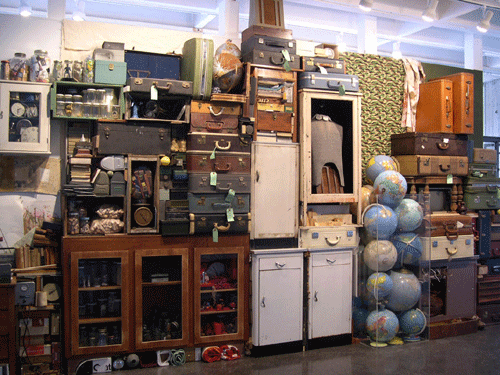
Doug Bell. Click for more.
Via Junk Culture, yet again:
Artist Doug Bell makes sculptures that range from small table-top sized, manipulated found object pieces, to life size tableaus and wall sized installations. The installations can be made up of hundreds of objects…. His work is a reflection of his need to make order out of chaos and give meaning to the incoherent.
Part of a series.
Posted Under:
Artists,
Things/Thinking by Rob Walker on April 16, 2010
Comments Off on Pictures of Stuff, cont’d: Clutter? Joy?
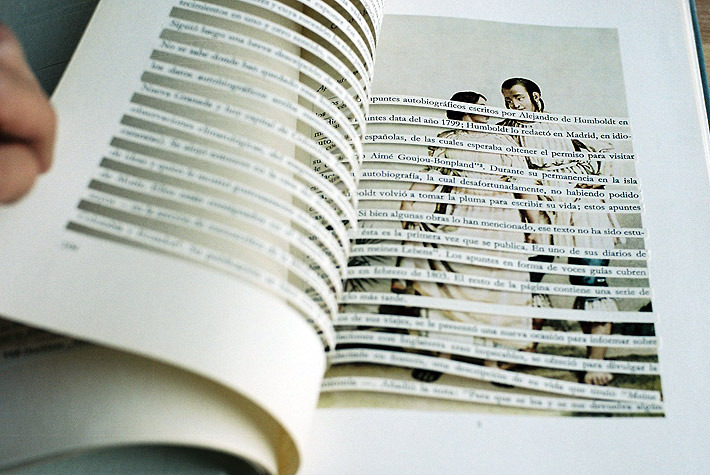
By Onlab. Click for more.
Via ffffound. Part of a series.
Posted Under:
Things/Thinking by Rob Walker on April 16, 2010
Comments Off on Books, the idea: Carefully sliced objects
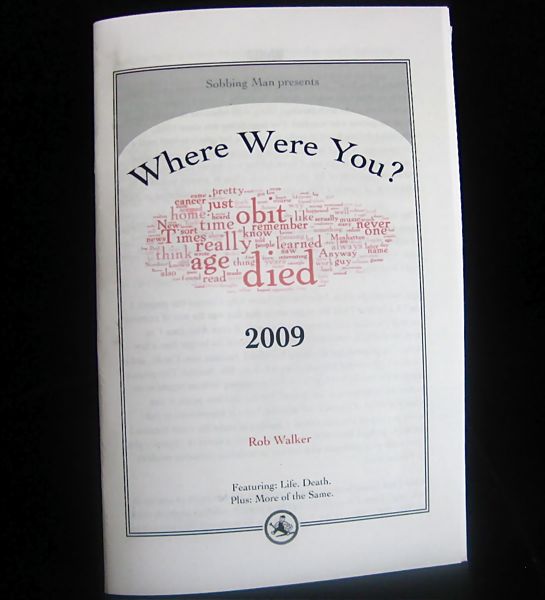
FEATURING: Life, Death, More of the Same.
As some of you know, Where Were You? is a side project of mine that dates back many years: I note “where I was” when I learned of various notable deaths, and record any related thoughts. For the last few years, I have collected these entries into annual zines. For 2009, instead of printing and mailing physical zines, I’m making a year of entries available as a sort of e-zine.
Also, instead of charging a buck or two, I’m making it available for free.
I have had great help and encouragement on this enterprise from Mr. Harold Check. In fact, I can safely say that without his efforts, technical and otherwise, there is no way I would have collected this year’s entries in any public form.
We’ve used two fine ebook services to present WWY2009. The Scribd version includes some illustrations. The Feedbooks version does not.
You don’t have to have a special e-reader device to make use of these services and get to this material — in fact, it’s easy to print it out if you like.
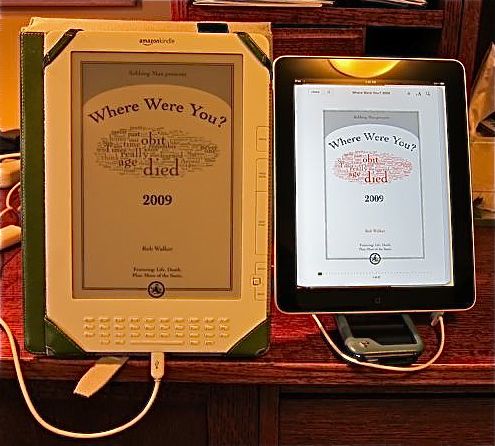
Early adopters are welcome.
Here is how to get Where Were You? 2009 — whether you use an ebook reader or not:
1. If you use a Kindle or an iPad (or probably any ebook reader, so far as I know): Download from Feedbooks, or Scribd.
2. If you use a reader app on your iPhone (such as the Kindle app or Stanza, a good free reader app that you can obtain here): Download from Feedbooks or Scribd. I assume most readers on most smartphones work easily with Feedbooks or Scribd documents, but let me know if you have trouble.
3. If (like me!) you don’t use any of that stuff, and you are happy to read it in the form of a PDF on your computer, or as a regular printout, Scribd is probably for you. Check out the “full-screen” book view for the complete retro zine experience. (And if you download it as a PDF, it seems this site will reorder the pages for booklet printing, should you wish to go that way: http://bookletcreator.com/.)
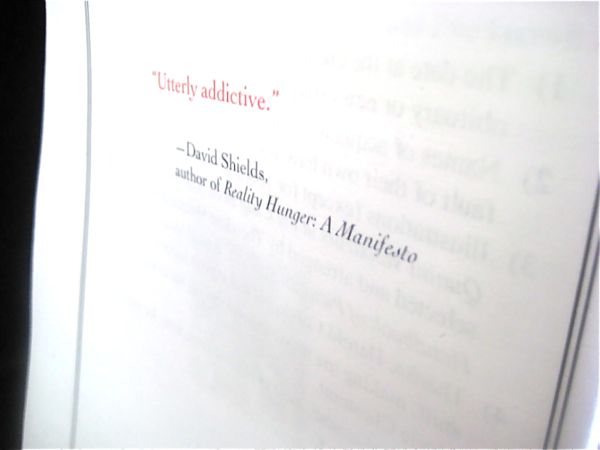
Thoughtful people have enjoyed past editions of WWY.
Also of course if you have questions or comments or run into problems with the above, your feedback is more than welcome.
I hope you’ll check out the 2009 edition — and help spread the word.
Thanks. Please continue…
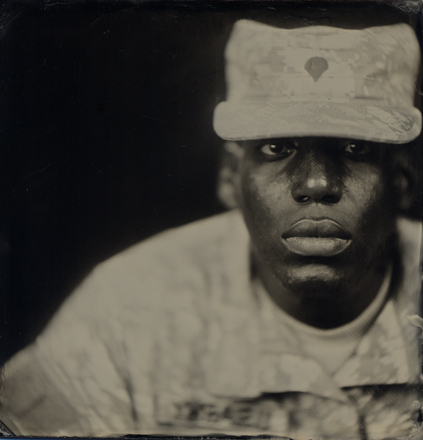
Please pardon this brief aside. I’m really excited about E‘s latest show, at the Telfair Museum of Art here in Savannah. The opening reception is tomorrow night. I don’t know how many Murketing readers are actually in Savannah, but for those who are, here’s the info:
Ellen Susan / Soldier Portraits
Opening Reception: Thursday April 15, 6 pm.
Telfair’s Jepson Center
Savannah, GA
If you can’t make the opening, check out the actual show before closes July 25. Many of the images on view are ambrotypes (and tintypes) made with the wet-plate collodion process. This is a rather complicated and intense antique process that, while difficult, produces one-of-a-kind images that look particularly amazing in person.
For various reasons I’ve been thinking a lot lately about recognition and the art process, and I think it’s an important dimension of this project. The combination of this process and these subjects strikes me as a useful antidote to the way we’ve gotten used to seeing soldiers in the press: Whatever your stance might be about the war, “the troops” are often just fleeting, interchangeable images, more of an idea than actual people.
The Soldier Portraits project started when we first moved to Savannah a couple of years ago; locally based soldiers, who were all around at the grocery store or the mall, were at the time preparing to deploy to Iraq, some for the third time. Suddenly it was impossible not to recognize them as more than simply “the troops,” but rather as individuals. I think these images — made with long exposures, captured through a difficult process onto what are in effect unique objects — force the viewer to undergo a similar process.
Yes, I’m biased. But in this instance, I’m also right.
Not in Savannah? Well at least visit the project’s web site.
Posted Under:
Artists,
To Do by Rob Walker on April 14, 2010
Comments Off on To Do In Savannah: “Soldier Portraits” At The Telfair Museum
Helga Steppan: “See Through is a series of twelve photographs. In which I audited all my personal belongings and divided them into a full spectrum of colour groupings.”
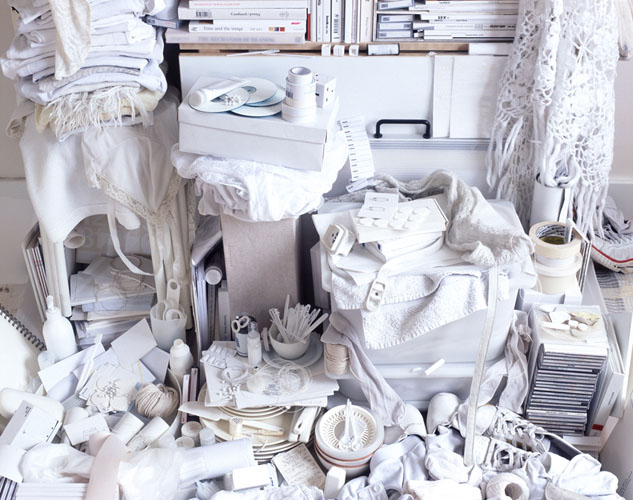
Helga Steppan / All My Stuff - White / Click for more.
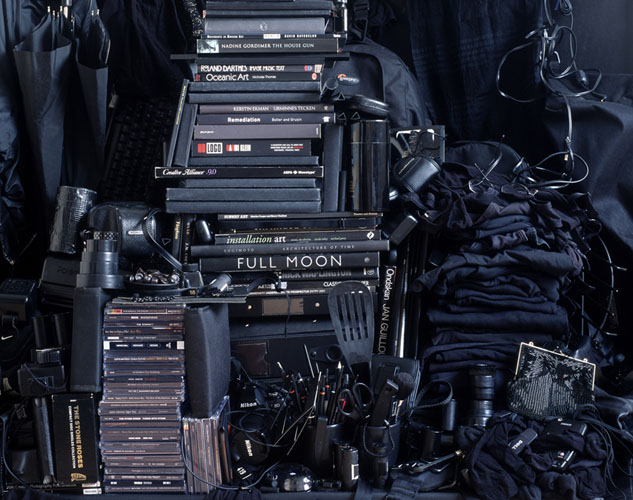
Helga Steppan / All My Stuff - Black / Click for more
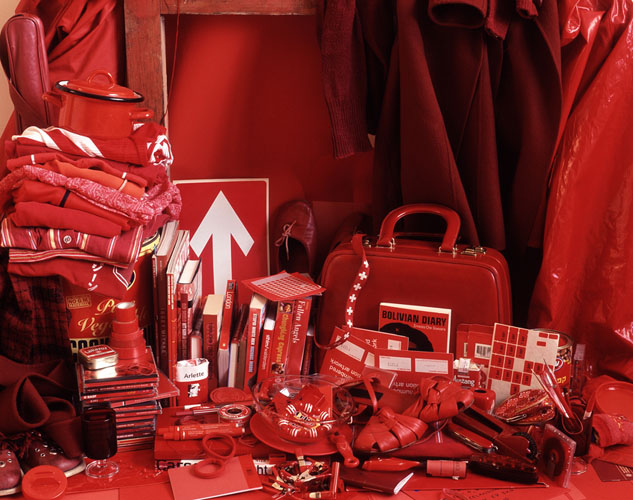
Helga Steppan / All My Stuff - Red / Click for more.
Part of an occasional series.
Posted Under:
Artists by Rob Walker on April 14, 2010
Comments Off on Pictures of stuff, cont’d: Color-grouped






 "
"





































 Kim Fellner's book
Kim Fellner's book  A
A